- Home
- James Joyce
Stephen Hero Page 5
Stephen Hero Read online
Page 5
— I think we know each other already.
She sat beside him on the sofa and he found out that she was studying in the same college with the Miss Daniels and that she always signed her name in Irish. She said Stephen should « learn Irish too » and join the League. A young man of the company, [with] whose face wore always the same look of studied purpose, spoke with her across Stephen addressing her familiarly by her Irish name. Stephen therefore spoke very formally and always addressed her as ‘Miss Clery.’ She seemed on her part to include him in the « general scheme of her nationalising charm: and when he helped her into her jacket she allowed his hands to rest for a moment against the warm flesh of her shoulders. »
* This phrase occurs in Joyce’s satirical poem, “The Holy Office,” which was written at about the same time as the present text. See Gorman, p. 140:
“So distantly I turn to view
The shamblings of that motley crew,
Those souls that hate the strength that mine has
Steeled in the school of old Aquinas.
Where they have crouched and crawled and prayed
I stand, the self-doomed, unafraid,
Unfellowed, friendless and alone,
Indifferent as the herring-bone,
Firm as the mountain-ridges where
I flash my antlers on the air.”
* The changed wording is written in pencil in the margin, perhaps at a later date than that of the MS.
* The words “loth to depart” are written in red crayon in the margin opposite these sentences.
* Opposite this paragraph the words, “fancy dress ball: Emma,” are written in red crayon.
-XVII-
Stephen’s home-life had by this time grown sufficiently unpleasant: the direction of his development was against the stream of tendency of his family. The evening walks with Maurice had been prohibited for it had become evident that Stephen was corrupting his brother to idle habits. Stephen was harassed very much by enquiries as to his progress at the College and Mr Daedalus, meditating upon the evasive answers, had begun to express a fear that his son was falling into bad company. The youth was given to understand that if he did not succeed brilliantly at the coming examination his career at the University would come to a close. He was not greatly troubled by this warning for he knew that his fate was, in this respect, with his godfather and not with his father. He felt that the moments of his youth were too precious to be wasted in a dull mechanical endeavour and he determined, whatever came of it, to prosecute his intentions to the end. His family expected that he would at once follow the path of remunerative respectability and save the situation but he could not satisfy his family. He thanked their intention: it had first fulfilled him with egoism; and he rejoiced that his life had been so self-centred. He felt [also] however that there were activities which it « would be a peril » to postpone.
Maurice accepted this prohibition with a bad grace and had to be restrained by his brother from overt disobedience. Stephen himself bore it lightly because he could ease himself greatly in solitude and for human channels, at the worst, he could resort to a few of his college-companions. He was now busily preparing his paper for the Literary and Historical Society and he took every precaution to ensure in it a maximum of explosive force. It seemed to him that the students might need only the word to enkindle them towards liberty or that, at least, his trumpet-call might bring to his side a certain minority of the elect. McCann was the Auditor of the Society and as he was anxious to know the trend of Stephen’s paper the two used often to leave the Library at ten o’clock and walk towards the Auditor’s lodgings, discussing. McCann enjoyed the reputation of a fearless, free-spoken young man but Stephen found it difficult to bring him to any fixed terms on matters which were held to be dangerous ground. McCann would talk freely on feminism and on rational life: he believed that the sexes should be educated together in order to accustom them early to each other’s influences and he believed that women should be afforded the same opportunities as were afforded to the so-called superior sex and he believed that women had the right to compete with men in every branch of social and intellectual activity. He also held the opinion that a man should live without using any kind of stimulant, that he had a moral obligation to transmit to posterity sound minds in sound bodies, and that he should not allow himself to be dictated to on the subject of dress by any conventions. Stephen delighted to riddle these theories with agile bullets.
— You would have no sphere of life closed to them?
— Certainly not.
— Would you have the soldiery, the police and the fire-brigade recruited also from them?
— There are certain social duties for which women are physically unfitted.
— I believe you.
— At the same time they should be allowed to follow any civil profession for which they have an aptitude.
— Doctors and lawyers?
— Certainly.
— And what about the third learned profession?
— How do you mean?
— Do you think they would make good confessors?
— You are flippant. The Church does not allow women to enter the priesthood.
— O, the Church!
Whenever the conversation reached this point McCann refused to follow it further. The discussions usually ended in [an impasse] a deadlock:
— But you go mountain-climbing in search of fresh air?
— Yes.
— And bathing in the summertime?
— Yes.
— And surely the mountain air and the salt water act as stimulants!
— Natural stimulants, yes.
— What do you call an unnatural stimulant?
— Intoxicating drinks.
— But they are produced from natural vegetable substances, aren’t they?
— Perhaps, but by an unnatural process.
— Then you regard a brewer as a high thaumaturgist?
— Intoxicating drinks are manufactured to satisfy artificially induced appetites. Man, in the normal condition, has no need for such props to life.
— Give me an example of man in what you call ‘the normal condition.’
— A man who lives a healthy, natural life.
— Yourself?
— Yes.
— Do you then represent normal humanity?
— I do.
— Then is normal humanity short-sighted and tone-deaf?
— Tone-deaf?
— Yes: I think you are tone-deaf.
— I like to hear music.
— What music?
— All music.
— But you cannot distinguish one air from another.
— No: I can recognise some airs.
— For instance?
— I can recognise ‘God save the Queen.’
— Perhaps because all the people stand up and take off their hats.
— Well, admit that my ear is a little defective.
— And your eyes?
— They too.
— Then how do you represent normal humanity?
— In my manner of life.
— Your wants and the manner in which you satisfy them, is it?
— Exactly.
— And what are your wants?
— Air and food.
— Have you any subsidiary ones?
— The acquisition of knowledge.
— And you need also religious comforts?
— Maybe so … at times.
— And women … at times?
— Never!
This last word was uttered with a moral snap of the jaws and in such a business-like tone of voice that Stephen burst out into a fit of loud laughter. As for the fact, though he was very suspicious in this matter, Stephen was inclined to believe in McCann’s chastity and much as he disliked it he chose to contemplate it rather than the contrary phenomenon. He almost trembled to think of that unhorizoned doggedness working its way backwards.
McC
ann’s insistence on a righteous life and his condemnation of licence as a sin against the future both annoyed and stung Stephen. It annoyed him because it savoured so strongly of paterfamilias and it stung him because it seemed to judge him incapable of that part. In McCann’s mouth he considered it unjust and unnatural and he fell back on a sentence of Bacon’s. The care of posterity, he quoted, is greatest in them that have no posterity: and for the rest he said that he « could not understand what right the future had to hinder him from any passionate exertions in the present. »
— That is not the teaching of Ibsen, said McCann.
— Teaching! cried Stephen.
— The moral of Ghosts is just the opposite of what you say.
— Bah! You regard a play as a scientific document.
— Ghosts teaches self-repression.
— O Jesus! said Stephen in agony.
— This is my lodging, said McCann, halting at the gate. I must go in.
— You have connected Ibsen and Eno’s fruit salt forever in my mind, said Stephen.
— Daedalus, said the Auditor crisply, you are a good fellow but you have yet to learn the « dignity of altruism and the responsibility of the human individual. »
Stephen had decided to address himself to Madden to [find out] ascertain where Miss Clery was to be found. He set about this task carefully. Madden and he were often together but their conversations were rarely serious and though the rustic mind of one was very forcibly impressed by the metropolitanism of the other both young men were on relations of affectionate familiarity. Madden who had previously tried in vain to infect Stephen with nationalistic fever was surprised to hear these overtures of his friend. He was delighted at the prospect of making such a convert and he began to appeal eloquently to the sense of justice. Stephen allowed his critical faculty a rest. The so-desired community for the realising of which Madden sought to engage his personal force seemed to him anything but ideal and the liberation which would have satisfied Madden would by no means have satisfied him. The Roman, not the Sassenach, was for him the tyrant of the islanders: and so deeply had the tyranny eaten into all souls that the intelligence, first overborne so arrogantly, was now eager to prove that arrogance its friend. The watchcry was Faith and Fatherland, a sacred word in that world of cleverly inflammable enthusiasms. With literal obedience and with annual doles the Irish bid eagerly for the honour which was studiously withheld from them to be given to nations which in the [present] past, as in the [past] present, had never bent the knee but in defiance. While the multitude of preachers assured them that high honours were on the way and encouraged them ever to hope. The last should be first, according to the Christian sentiment, and whosoever humbled himself, exalted and in reward for several centuries of obscure fidelity the « Pope’s Holiness » had presented a tardy cardinal to an island which was for him, perhaps, only the « afterthought of Europe. » *
Madden was prepared to admit the truth of much of this but he gave Stephen to understand that the new movement was politic. If the least infidelity were hoisted on the standard the people would not flock to it and for this reason the promoters desired as far as possible to work hand in hand with the priests. Stephen objected that this working hand in hand with the priests had over and over again ruined the chances of revolutions. Madden agreed: but now at least the priests were on the side of the people.
— Do you not see, said Stephen, that they encourage the study of Irish that their flocks may be more safely protected from the « wolves of disbelief »; they consider it is an opportunity to withdraw the people into a past of literal, implicit faith?
— But really our peasant has nothing to gain from English Literature.
— Rubbish!
— Modern at least. You yourself are always railing …
— English is the medium for the Continent.
— We want an Irish Ireland.
— It seems to me you do not care what banality a man expresses so long as he expresses it in Irish.
— I do not entirely agree with your modern notions. We want to have nothing of this English civilisation.
— But the civilisation of which you speak is not English — it is Aryan. The modern notions are not English; they point the way of Aryan civilisation.
— You want our peasants to ape the gross materialism of the Yorkshire peasant?
— One would imagine the country was inhabited by cherubim. Damme if I see much difference in peasants: they all seem to me as like one another as a peascod is like another peascod. The Yorkshireman is perhaps better fed.
— Of course you despise the peasant because you live in the city.
— I don’t despise his office in the least.
— But you despise him — he’s not clever enough for you.
— Now, you know, Madden that’s nonsense. To begin with he’s as cute as a fox — try to pass a false coin on him and you’ll see. But his cleverness is all of a low order. I really don’t think that the Irish peasant « represents » a very admirable type of culture.
— That’s you all out! Of course you sneer at him because he’s not up-to-date and lives a simple life.
— Yes, a life of dull routine — the calculation of coppers, the weekly debauch and the weekly piety — a life lived in cunning and fear between the shadows of the parish chapel and the asylum!
— The life of a great city like London seems to you better?
— The [English] intelligence of an English city is not perhaps at a very high level but at least it is higher than the mental swamp of the Irish peasant.
— And what about the two as moral beings?
— Well?
— The Irish are noted for at least one virtue all the world over.
— Oho! I know what’s coming now!
— But it’s a fact — they are chaste.
— To be sure.
— You like to run down your own people at every hand’s turn but you can’t accuse them …
— Very good: you are partly right. I fully recognise that my countrymen have not yet advanced [to] as far as the machinery of Parisian harlotry because …
— Because …?
— Well, because they can do it by hand, that’s why!
— Good God, you don’t mean to say you think …
— My good youth, I know what I am saying is true and so do you know it. Ask Father Pat and ask Dr Thisbody and ask Dr Thatbody. I was at school and you were at school — and that’s enough about it.
— O, Daedalus!
This accusation laid a silence on the conversation. Then Madden spoke:
— Well, if these are your ideas I don’t see what you want coming to me and talking about learning Irish.
— I would like to learn it — as a language, said Stephen lyingly. At least I would like to see first.
— So you admit you are an Irishman after all and not one of the red garrison.
— Of course I do.
— And don’t you think that every Irishman worthy of the name should be able to speak his native tongue?
— I really don’t know.
— And don’t you think that we as a race have a right to be free?
— O, don’t ask me such questions, Madden. You can use these phrases of the platform but I can’t.
— But surely you have some political opinions, man!
— I am going to think them out. I am an artist, don’t you see? Do you believe that I am?
— O, yes, I know you are.
— Very well then, how the devil can you expect me to settle everything all at once? Give me time.
So it was decided that Stephen was to begin a course of lessons in Irish. He bought the O’Growney’s primers published by the Gaelic League but refused either to pay a subscription to the League or to wear the badge in his buttonhole. He had found out what he had desired, namely, the class in which Miss Clery was. People at home did not seem opposed to this new freak of his. Mr Casey taught him a few Southern songs in Irish and alwa
ys raised his glass to Stephen saying “Sinn Fein” instead of “Good Health.” Mrs Daedalus was probably pleased for she thought that the superintendence of priests and the society of harmless enthusiasts might succeed in influencing her son in the right direction: she had begun to fear for him. Maurice said nothing and asked no questions. He did not understand what made his brother associate with the patriots and he did not believe that the study of Irish seemed in any way useful to Stephen: but he was silent and waited. Mr Daedalus said that he did not mind his son’s learning the language so long as it did not keep him from his legitimate work.
One evening when Maurice came back from school he brought with him the news that the retreat would begin in three days’ time. This news suddenly delivered showed Stephen his position. He could hardly believe that in a year his point of view had changed so completely. Only twelve months ago he had been clamouring for forgiveness and promising endless penances. He could hardly believe that it was no other than he who had clung so fiercely to the sole means of salvation which the Church vouchsafes to her guilty children. He marvelled at the terror which had then possessed him. One evening during the retreat he asked his brother what kind of sermons the priest was giving. The two were standing together looking into the window of a stationer’s shop and it was a picture of S. Anthony in the window which had led to the question. Maurice smiled broadly as he answered:
— Hell today.
— And what kind of a sermon was it?
— Usual kind of thing. Stink in the morning and pain of loss in the evening.
Stephen laughed and looked at the square-shouldered boy beside him. Maurice announced facts in a dry satirical voice and his cloudy complexion did not change colour when he laughed. He made Stephen think of the pictures in ‘Silas Verney.’ His sombre gravity, his careful cleansing of his muchworn clothes, and the premature disillusionment of his manner all suggested the human vesture of some spiritual or philosophic problem transplanted from Holland. Stephen did not know in what stage the problem was and he thought it wiser to allow it its own path of solution.

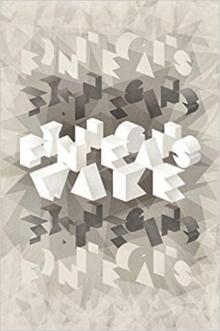 Penguin Classics the Restored Finnegans Wake
Penguin Classics the Restored Finnegans Wake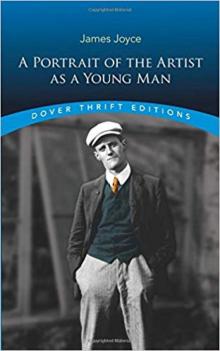 A Portrait of the Artist as a Young Man (Dover Thrift Editions)
A Portrait of the Artist as a Young Man (Dover Thrift Editions)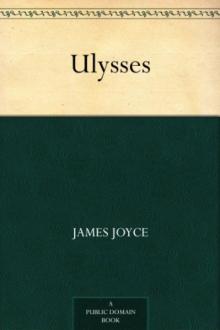 Ulysses
Ulysses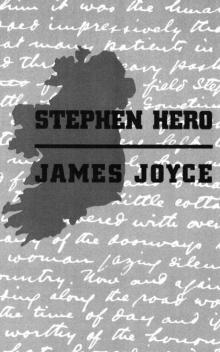 Stephen Hero
Stephen Hero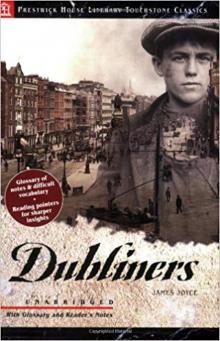 Dubliners
Dubliners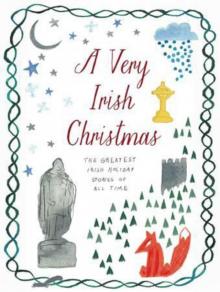 A Very Irish Christmas
A Very Irish Christmas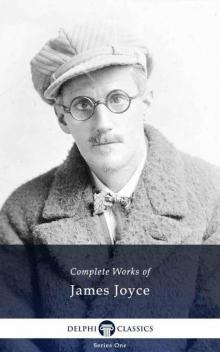 The Complete Works of JAMES JOYCE
The Complete Works of JAMES JOYCE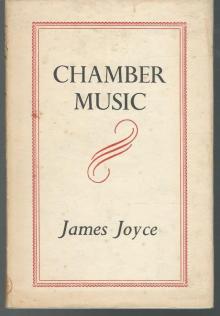 Chamber Music
Chamber Music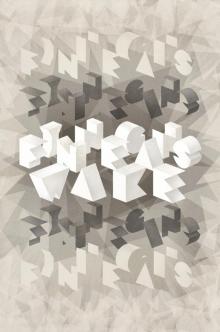 The Restored Finnegans Wake
The Restored Finnegans Wake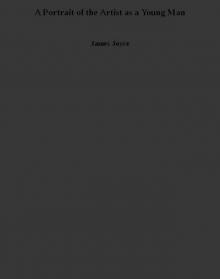 A Portrait of the Artist as a Young Man
A Portrait of the Artist as a Young Man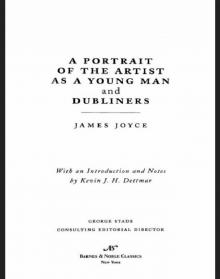 Portrait of the Artist as a Young Man and Dubliners (Barnes & Noble Classics Series)
Portrait of the Artist as a Young Man and Dubliners (Barnes & Noble Classics Series)